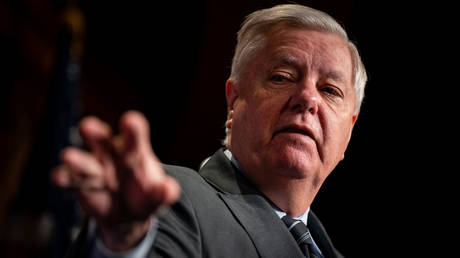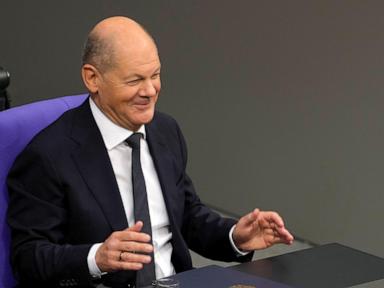ARTICLE AD BOX
US special envoy Amos Hochstein said in Beirut Tuesday that an end to the Israel-Hezbollah war was "now within our grasp" as he met officials to discuss a truce plan largely endorsed by Lebanon.
The United States and France have spearheaded efforts for a ceasefire in the war, which escalated in late September after nearly a year of deadly exchanges of fire between Hezbollah and Israeli troops.
Israel expanded the focus of its operations from Gaza to Lebanon, vowing to secure its northern border to allow tens of thousands of people displaced by the cross-border fire to return home.
Since the clashes began with Hezbollah's attacks on Israel, more than 3,544 people in Lebanon have been killed, authorities have said.
Most of the deaths have been since late September, among them more than 200 children, according to the United Nations.
After meeting with Hezbollah-allied parliament speaker Nabih Berri, who has led mediation on behalf of the group, Hochstein told reporters he saw "a real opportunity" to end the fighting.
"I'm here in Beirut to facilitate that decision, but it's ultimately the decision of the parties... It is now within our grasp."
Berri told pan-Arab daily Asharq al-Awsat after the meeting that "the situation is good, in principle", adding his team and US representatives still had "some technical details" to settle.
Hochstein also met Lebanese Prime Minister Najib Mikati and army chief Joseph Aoun.
A Lebanon-based diplomat, requesting anonymity, said "progress" had been made in the talks.
A Lebanese official said Monday that the government had "a very positive view" of the truce plan.
But Prime Minister Benjamin Netanyahu said Monday that Israel would continue to conduct military operations against Hezbollah even if a ceasefire was reached.
"We will be forced to ensure our security in the north (of Israel) and to systematically carry out operations against Hezbollah's attacks... even after a ceasefire", to keep the group from rebuilding, he told parliament.
Deaths in Lebanon, Israel
Hezbollah began its cross-border attacks in support of its ally Hamas following the Palestinian group's attack on Israel on October 7, 2023, which sparked the war in Gaza.
Hamas's attack resulted in the deaths of 1,206 people, mostly civilians, according to an AFP tally of Israeli official figures.
The health ministry in Hamas-run Gaza said the death count from the resulting war had reached 43,972 people, the majority civilians. The United Nations considers the figures reliable.
Of 251 hostages seized during the October 7 attack, 97 remain in Gaza including 34 the Israeli military says are dead.
Netanyahu, in a video showing him inside Gaza and wearing a flak jacket and helmet, on Tuesday offered a $5-million reward to anyone in the territory "who brings out a hostage".
Since expanding its operations to Lebanon in September, Israel has conducted extensive bombing campaigns primarily targeting Hezbollah strongholds.
The UN said Tuesday that more than 200 children had been killed in Lebanon since Israel escalated its campaign.
"Despite more than 200 children killed in Lebanon in less than two months, a disconcerting pattern has emerged: their deaths are met with inertia from those able to stop this violence," said UN children's agency spokesman James Elder.
Israel has also sent ground troops into southern Lebanon, where it said Tuesday one soldier had been killed in combat and three wounded.
Lebanon's army said three soldiers were killed when Israel struck their position in south Lebanon on Tuesday.
Hezbollah has continued to launch rockets, drones and missiles into Israel almost daily.
On Tuesday, Israel's military said some 40 projectiles were fired into central and northern Israel, lightly wounding four people.
That followed salvos on Monday that killed one woman in Shfaram and wounded 10 people there and five in Israel's commercial hub Tel Aviv.
Hezbollah said Tuesday it had launched "a salvo of missiles" at the Glilot military intelligence base in the Tel Aviv suburbs.
It said it also attacked Israeli troops in four places in south Lebanon, including near the flashpoint town of Khiam.
The United Nations Interim Force in Lebanon (UNIFIL) later said four Ghanaian peacekeepers were wounded when a rocket, "fired most likely by non-state actors", hit their base.
Another base in Shamma "was impacted by five rockets", UNIFIL said, and elsewhere "an armed person directly fired at" a patrol.
It did not report wounded or specify who was behind those incidents.
Israel's military accused Hezbollah of firing on the peacekeepers.
'Everyone's interest'
US State Department spokesperson Matthew Miller said Monday the full implementation of UN Security Council Resolution 1701, which ended the last Hezbollah-Israel war in 2006, was "what we believe is in everyone's interest".
Under the resolution, Lebanese troops and UN peacekeepers should be the only armed forces deployed in south Lebanon, where Hezbollah holds sway.
A Lebanese official said US ambassador Lisa Johnson had discussed the truce plan last week with Mikati and Berri.
If an agreement was reached, he said, the United States and France would issue a joint statement, followed by a 60-day truce during which Lebanon would deploy troops in the south.
However, Eyal Pinko, a retired Israeli navy commander and senior research fellow at the Begin-Sadat Center for Strategic Studies at Bar Ilan University near Tel Aviv, said hopes for a speedy ceasefire were "wishful thinking".
"The most important thing that is required is that there will be no Hezbollah 30 to 40 kilometres (20 to 25 miles) from the border so that Israel can protect itself if there is a ground manoeuvre," Pinko said.
"Iran and Hezbollah would not accept that."
(Except for the headline, this story has not been edited by NDTV staff and is published from a syndicated feed.)
.png)
 2 days ago
1
2 days ago
1








 English (US)
English (US)